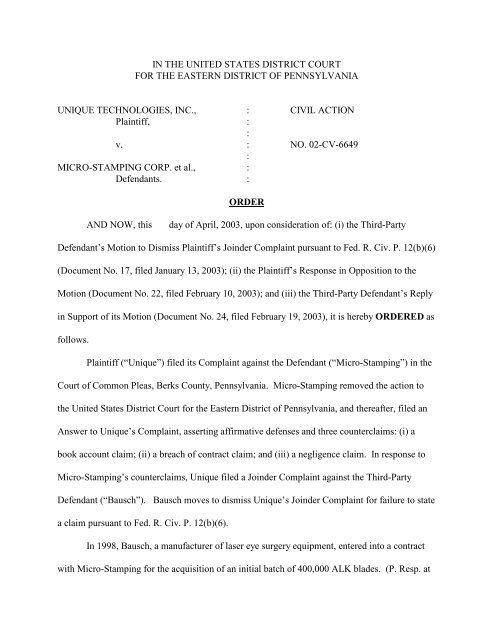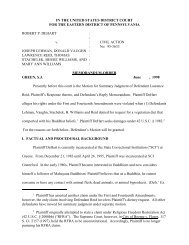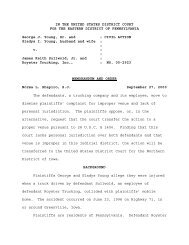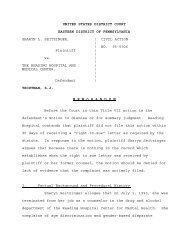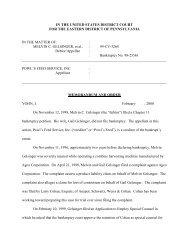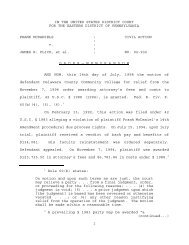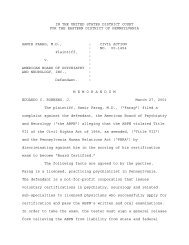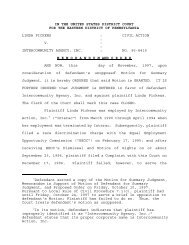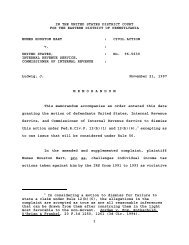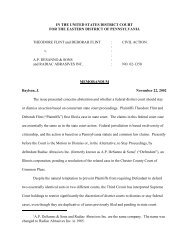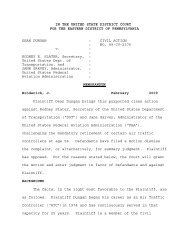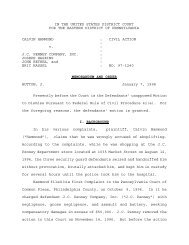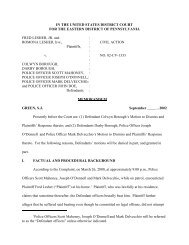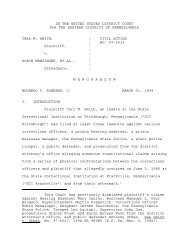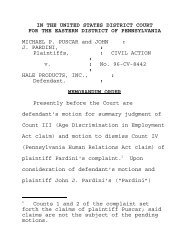CIVIL ACTION Plaintiff - Eastern District of Pennsylvania
CIVIL ACTION Plaintiff - Eastern District of Pennsylvania
CIVIL ACTION Plaintiff - Eastern District of Pennsylvania
Create successful ePaper yourself
Turn your PDF publications into a flip-book with our unique Google optimized e-Paper software.
IN THE UNITED STATES DISTRICT COURT<br />
FOR THE EASTERN DISTRICT OF PENNSYLVANIA<br />
UNIQUE TECHNOLOGIES, INC., : <strong>CIVIL</strong> <strong>ACTION</strong><br />
<strong>Plaintiff</strong>, :<br />
:<br />
v. : NO. 02-CV-6649<br />
:<br />
MICRO-STAMPING CORP. et al., :<br />
Defendants. :<br />
ORDER<br />
AND NOW, this<br />
day <strong>of</strong> April, 2003, upon consideration <strong>of</strong>: (i) the Third-Party<br />
Defendant’s Motion to Dismiss <strong>Plaintiff</strong>’s Joinder Complaint pursuant to Fed. R. Civ. P. 12(b)(6)<br />
(Document No. 17, filed January 13, 2003); (ii) the <strong>Plaintiff</strong>’s Response in Opposition to the<br />
Motion (Document No. 22, filed February 10, 2003); and (iii) the Third-Party Defendant’s Reply<br />
in Support <strong>of</strong> its Motion (Document No. 24, filed February 19, 2003), it is hereby ORDERED as<br />
follows.<br />
<strong>Plaintiff</strong> (“Unique”) filed its Complaint against the Defendant (“Micro-Stamping”) in the<br />
Court <strong>of</strong> Common Pleas, Berks County, <strong>Pennsylvania</strong>. Micro-Stamping removed the action to<br />
the United States <strong>District</strong> Court for the <strong>Eastern</strong> <strong>District</strong> <strong>of</strong> <strong>Pennsylvania</strong>, and thereafter, filed an<br />
Answer to Unique’s Complaint, asserting affirmative defenses and three counterclaims: (i) a<br />
book account claim; (ii) a breach <strong>of</strong> contract claim; and (iii) a negligence claim. In response to<br />
Micro-Stamping’s counterclaims, Unique filed a Joinder Complaint against the Third-Party<br />
Defendant (“Bausch”). Bausch moves to dismiss Unique’s Joinder Complaint for failure to state<br />
a claim pursuant to Fed. R. Civ. P. 12(b)(6).<br />
In 1998, Bausch, a manufacturer <strong>of</strong> laser eye surgery equipment, entered into a contract<br />
with Micro-Stamping for the acquisition <strong>of</strong> an initial batch <strong>of</strong> 400,000 ALK blades. (P. Resp. at
p. 6). ALK blades are vital components to ACS microkeratome corneal resection instruments,<br />
the medical devices commonly used by eye surgeons in “LASIK” (Laser In-Situ Keratomileusis)<br />
surgery to correct vision deficiencies. Subsequently, Micro-Stamping entered into a contract<br />
with Unique, a supplier to Micro-Stamping, in which Micro-Stamping would send metal ALK<br />
blanks to Unique, and Unique would process the ALK blanks into ALK blades, according to<br />
specifications, and ship the finished ALK blades back to Micro-Stamping. (P. Resp. at p. 7).<br />
Micro-Stamping would then resell the finished ALK blades to Bausch. (P. Resp. at p. 7).<br />
Bausch contended that the ALK blades were improperly polished and/or overly sharpened<br />
and failed to meet the specifications agreed upon between Bausch and Micro-Stamping. (P.<br />
Resp. at p. 7). As a result, Micro-Stamping agreed to accept a debit memo from Bausch to<br />
reconcile for the alleged nonconforming ALK blades. (P. Resp. at p. 7). Thereafter, Micro-<br />
Stamping issued four debit memos, totaling $244,277.81, to Unique in an effort to share the<br />
losses. Unique asserted that all but 1,546 <strong>of</strong> the ALK blades conformed to the specifications<br />
agreed upon between Unique and Micro-Stamping, but nevertheless agreed to accept the debit<br />
memos, so long as Micro-Stamping would agree to contract with Unique for the production <strong>of</strong><br />
1,400,000 ALK blades. (P. Resp. at p. 8). In turn, Unique promised it would allow Micro-<br />
Stamping to apply a $6,000 credit per month against the monthly invoices from Unique to Micro-<br />
Stamping. (P. Resp. at p. 8). Micro-Stamping applied over $100,000 in credit against Unique’s<br />
monthly invoices before it finally discontinued shipping the ALK blanks to Unique. (P. Resp. at<br />
p. 8).<br />
Rule 12(b) <strong>of</strong> the Federal Rules <strong>of</strong> Civil Procedure states, in relevant parts, that, “Every<br />
defense, in law or fact, to a claim for relief in any pleading, whether a claim, counterclaim, cross-<br />
2
claim, or third-party claim, shall be asserted in the responsive pleading thereto if one is required,<br />
except that the following defenses may at the option <strong>of</strong> the pleader be made by motion: . . . (6)<br />
failure to state a claim upon which relief can be granted.” In a Rule 12(b)(6) motion to dismiss,<br />
the court will assume the truth <strong>of</strong> all plaintiff’s well-pleaded facts, and view those facts in the<br />
light most favorable to the plaintiff. The court is directed to only dismiss the complaint when the<br />
plaintiff cannot prove a set <strong>of</strong> facts, in support <strong>of</strong> the claim, for which relief may be granted. See<br />
Conley v. Gibson, 355 U.S. 41, 78 S. Ct. 99, 2 L. Ed. 2d 80 (1957); City <strong>of</strong> Philadelphia v. Lead<br />
Industries Ass’n, Inc., 994 F.2d 112 (3d Cir. 1993). However, the court is not “bound to accept<br />
as true a legal conclusion couched as a factual allegation.” Papasan v. Allain, 478 U.S. 265, 286,<br />
106 S. Ct. 2932, 2944, 92 L. Ed. 2d 209 (1986); see also General Motors Corp. v. New A.C.<br />
Chevrolet, 263 F.3d 296, 333 (3d Cir. 2001).<br />
A. Book Account Claim<br />
Micro-Stamping’s first counterclaim against Unique is for the nonpayment or incomplete<br />
payment <strong>of</strong> four debit memos issued by Micro-Stamping to Unique, as a result <strong>of</strong> alleged<br />
nonconforming ALK blades. (T.P.D. Motion ex. B at p. 8). Unique claims that if it is liable to<br />
Micro-Stamping for the debit memos, then Bausch could be liable, in whole or in part, to Unique.<br />
However, Unique <strong>of</strong>fers this Court no recognizable legal cause <strong>of</strong> action, and this Court is<br />
unaware <strong>of</strong> any such cause <strong>of</strong> action, which Unique could possibly assert against Bausch for<br />
contribution, in whole or in part, for Unique’s liability to Micro-Stamping for the nonpayment or<br />
incomplete payment on debit memos issued by Micro-Stamping to Unique. 1<br />
1 Unique is reminded that all alleged representations made by any party at a Rule 16<br />
Conference are not cognizable in the formulation <strong>of</strong> a 12(b)(6) motion or defense.<br />
3
B. Breach <strong>of</strong> Contract Claim<br />
Micro-Stamping’s second counterclaim against Unique alleges that Unique breached its<br />
contract with Micro-Stamping for failing to finish the ALK blades according to the specifications<br />
<strong>of</strong> the contract. (T.P.D. Motion ex. B at p. 9). Unique claims that if it is liable for breach <strong>of</strong><br />
contract to Micro-Stamping, then Bausch could be liable to Unique for indemnification and/or<br />
contribution. Unique’s position is unpersuasive and legally insufficient.<br />
Typically, privity <strong>of</strong> contract is a mandatory prerequisite for a party to bring a breach <strong>of</strong><br />
contract claim. Privity <strong>of</strong> contract is a longstanding pillar <strong>of</strong> <strong>Pennsylvania</strong> contract law. See,<br />
e.g., Evans v. Otis Elevator Co., 403 Pa. 13, 18, 168 A.2d 573, 575 (1961)(“Generally, a party to<br />
a contract does not became [sic] liable for a breach there<strong>of</strong> to one who is not a party thereto.”);<br />
Finney v. Finney, 16 Pa. 380 (1851)(privity <strong>of</strong> contract between the plaintiff and defendant is<br />
essential to the right to maintain a suit on a contract). Unique only maintains a contractual<br />
relationship with Micro-Stamping, while Micro-Stamping is in privity with both Unique and<br />
Bausch, through the formation <strong>of</strong> two separate, distinct, and independent contracts. Unique has<br />
not contracted with Bausch, and Bausch has not contracted with Unique; neither party is in<br />
privity with the other.<br />
Indemnification serves as a method for fault shifting to a third party, where the party<br />
legally obligated to pay damages caused by another is without fault, but for its legal status. See,<br />
e.g., Builders Supply Co. v. McCabe, 366 Pa. 322, 328, 77 A.2d 368, 371 (1951)(There is a right<br />
to indemnity where a defendant is held vicariously liable based upon “fault that is imputed or<br />
constructive only, being based on some legal relation between the parties . . .”); Sirianni v.<br />
Nugent Bros., Inc., 509 Pa. 564, 570-71, 506 A.2d 868, 871 (1986)(indemnification lies “when a<br />
4
defendant who has been found liable to a plaintiff solely by operation <strong>of</strong> law, rather than by<br />
active fault, seeks to recover for his loss from a defendant who was actually responsible for the<br />
accident which occasioned the loss.”); Burch v. Sears, Roebuck and Co., 320 Pa. Super. 444,<br />
457-58, 467 A.2d 615, 622 (1983)(“Indemnity is only available from those who are primarily<br />
liable to those who are merely secondarily or vicariously liable.”).<br />
Before Unique can assert a valid claim for indemnification against Bausch, Micro-<br />
Stamping must first prevail on its counterclaim against Unique; the counterclaim will only be<br />
successful if it is proven that Unique had some degree <strong>of</strong> fault for the production <strong>of</strong><br />
nonconforming ALK blades. However, if Unique did have some degree <strong>of</strong> fault for producing<br />
nonconforming ALK blades, then it can no longer have an indemnification claim against any<br />
party, as indemnification is a method <strong>of</strong> fault shifting, not sharing. Conversely, if Unique<br />
produced conforming ALK blades, then Micro-Stamping’s counterclaim for breach <strong>of</strong> contract<br />
will fail, and without a valid counterclaim, Unique’s Joinder Complaint on the breach <strong>of</strong> contract<br />
claim will also fail.<br />
Contribution serves as a method for fault sharing among two or more joint tortfeasors.<br />
Joint tortfeasors are defined as, “two or more persons jointly or severally liable in tort for the<br />
same injury to persons or property, whether or not judgment has been recovered against all or<br />
some <strong>of</strong> them.” 42 Pa. C.S.A. § 8322 (emphasis added); see also TVSM, Inc.v. Alexander &<br />
Alexander, Inc., 583 F. Supp. 1089, 1092 (E.D. Pa. 1984). <strong>Pennsylvania</strong> law does not recognize<br />
a right to contribution in a breach <strong>of</strong> contract case. See, e.g., Kemper National P & C Co. v.<br />
Smith, 419 Pa. Super. 295, 309, 615 A.2d 372, 380 (1992)(“<strong>Pennsylvania</strong> only authorizes<br />
contribution among joint tortfeasors.”); TVSM, Inc., 583 F. Supp. at 1092 (“A right to<br />
5
contribution in <strong>Pennsylvania</strong> arises only among joint tortfeasors.”); Richardson v. John F.<br />
Kennedy Memorial Hosp., 838 F. Supp. 979, 989 (E.D. Pa. 1993)(“Under <strong>Pennsylvania</strong> law, the<br />
right to contribution only arises among joint tortfeasors.”). But see Resolution Trust Corp. v.<br />
Gross, 1996 WL 89380 at *2 (E.D. Pa.)(calling into question the limitation on contribution<br />
claims). Furthermore, a third-party defendant can only be held liable for contribution as a joint<br />
tortfeasor if that third party-defendant is found directly liable to the plaintiff. Eagle-Picher<br />
Industries, Inc. v. United States, 846 F.2d 888, 892 n.4 (3d Cir. 1988); see also Resolution Trust<br />
Corp., 1996 WL 89380 at *2.<br />
Unique’s third-party complaint against Bausch for contribution on Micro-Stamping’s<br />
breach <strong>of</strong> contract counterclaim against Unique must fail for two reasons. First, Micro-<br />
Stamping’s counterclaim against Unique sounds in contract for Unique’s alleged failure to<br />
produce ALK blades according to specifications. Unique cannot assert a legally permissible<br />
cause <strong>of</strong> action under <strong>Pennsylvania</strong> state law for contribution on a breach <strong>of</strong> contract case.<br />
Contribution claims are limited to tort actions among joint tortfeasors. Second, to state a legally<br />
sufficient cause <strong>of</strong> action for contribution, Unique must allege that Bausch is directly liable to<br />
Micro-Stamping for Unique’s alleged production <strong>of</strong> nonconforming ALK blades. However,<br />
Unique has failed to articulate a valid theory <strong>of</strong> law for Bausch’s legal liability to Micro-<br />
Stamping for Unique’s alleged production <strong>of</strong> nonconforming ALK blades.<br />
C. Negligence Claim<br />
Micro-Stamping’s third counterclaim against Unique alleges that Unique breached a duty<br />
<strong>of</strong> care in failing to finish the ALK blades according to specifications. (T.P.D. Motion ex. B at p.<br />
10). Unique claims that if it is liable to Micro-Stamping on its alleged negligence claim, then<br />
6
Bausch shall be liable to Unique for contribution and/or indemnification. However, Micro-<br />
Stamping’s underlying counterclaim against Unique must fail, and accordingly, Unique’s Joinder<br />
Complaint on the negligence count against Bausch also must fail.<br />
<strong>Pennsylvania</strong> law is reluctant to allow a negligence claim in an action based upon breach<br />
<strong>of</strong> contract. The “gist <strong>of</strong> the action” test permits tort recovery only if it can be said that the<br />
“tortious wrong ascribed to the defendant [is] the gist <strong>of</strong> the action with the contract being<br />
collateral.” Bohler-Uddeholm America, Inc. v. Ellwood Group, Inc., 247 F.3d 79, 103 (3d Cir.<br />
2001). “The important difference between contract and tort actions is that the latter lie from the<br />
breach <strong>of</strong> duties imposed as a matter <strong>of</strong> social policy while the former lie for the breach <strong>of</strong> duties<br />
imposed by mutual consensus.” Id. The duties allegedly violated by Unique, as to its<br />
relationship with Micro-Stamping, clearly arise from duties imposed by contract based upon the<br />
mutual consent <strong>of</strong> Unique and Micro-Stamping. Public policy does not demand Unique to<br />
process ALK blades that conform to Micro-Stamping’s specifications; this duty is solely a<br />
creature <strong>of</strong> contract. The gist <strong>of</strong> this action is based upon contract, and therefore Micro-<br />
Stamping’s negligence counterclaim against Unique, and Unique’s Joinder Complaint on the<br />
negligence count against Bausch, are both legally insufficient.<br />
For the foregoing reasons, Bausch’s Motion to Dismiss <strong>Plaintiff</strong>’s Joinder Complaint<br />
pursuant to Fed. R. Civ. P. 12(b)(6) is hereby GRANTED.<br />
BY THE COURT:<br />
_______________________<br />
Legrome D. Davis, U.S.D.J.<br />
7


